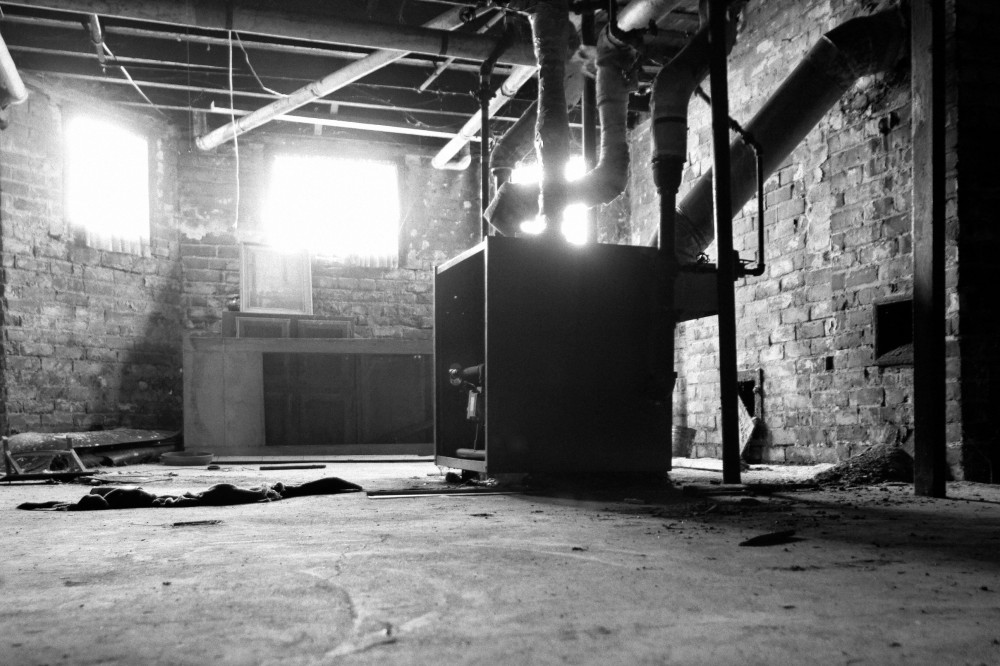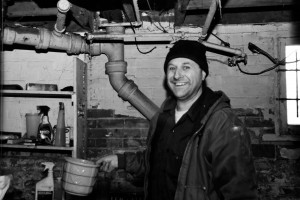Or not.
The plumbing project has had its ups and downs. With the help of our awesome contractor/plumber/handyman Andy Davis, we’ve gotten the core plumbing runs connected. We now have modern (and more importantly, not-worth-stealing) PEX pipe runs from the basement to the first floor bathroom and kitchen. We cut off some unnecessary galvanized pipes in the basement, capped off what we don’t need for now, and generally got a grip on the cold system to the point where if we need to run some water during construction, we can do that (although the drain isn’t fixed yet: Waiting on power for that).
We had another contractor come out today: Kim Soley from Soley Heating & Cooling. He came to us highly recommended as an expert in these types of older boiler systems. He opened up the boiler, shined his light in the bottom, then without saying a word, looked up at me. It didn’t take an expert to see that the burners were corroded and broken.
Without any other diagnoses, we’re already looking at $800-$1000 just to repair the burners in the boiler—and that’s if the rest of the system is in perfect working order (hint: it’s not). As we mentioned earlier, the copper scrappers got some of the radiator hookups while the house was vacant, and the kitchen radiator needs to be replaced entirely. A radiator on the second floor may need repairs as well. Pending a pressure test (compressed air is applied to the entire system to check for leaks), we really don’t know the extent of the damage; judging by how corroded the burners were and the general condition of the boiler itself, it’s hard to be optimistic.
The water heater, at least, was most likely salvageable for the time being. Andy got a new pressure relief valve put in (the old one got stolen), and filled the tank with cold water. We haven’t fired it up yet, but it’s from 1998 and looks to be in relatively good shape, so it probably works.
One of our options is to replace the boiler and the water heater entirely with an ultra-efficient condensing boiler. This is an extremely modern (and extremely efficient) system that is wall-mounted, takes up much less space than the massive boiler, and negates the need for a separate water heater. There are tax credits and rebates available from both the Federal government as well as the utility company; however, we’re looking at a tremendous initial cost (nearly ten thousand dollars). Eventually, a system like this will pay for itself in cost savings… but you know the drill. It takes money to save money.
It comes down to this: Either we nickel-and-dime the heating system, which may eventually culminate in needing to replace the boiler anyway, after spending thousands on it, or we figure out a way to come up with the money to just get an entirely modern system and be done with it.
Hey, if anybody knows a progressive ultra-efficient boiler company that wants a social media success story (imagine the headlines: “modernizing a 113-year-old Victorian home with our ultra-efficient boiler”!), point them this way. We’ll happily take handouts at this point.



I guess maybe if the rebates totaled 4k (they likely won't, typically they are 2k max) and it brought the overall cost to 6k it wouldn't be as hard to stomach as 10k, but either way it's a large investment.
Really hope you guys figure out away to pull it off!
Having spoken with over a half dozen contractors, the wall mount units? Are generally not suitable for a home of that size unless designed for cascading operation. Especially not with old style radiators, which are highly inefficient. Most of the "efficient" units are also rated at hot water temperature (160F) whereas the correct water temperature for baseboard / radiant is 190F. Because the base system is so old, an aluminum heat exchanger has a higher likelihood of the copper/aluminum reaction problems occurring unless you watch the loop water like a hawk.
That said, your realistic options are actually not as bad as you might think. Option A would be to use a slightly less efficient boiler with a cast iron heat exchanger. This drops your boiler costs significantly by replacing like for like, essentially. You still get better efficiency (84%+ for Weil-McLain who is highly recommended; my Weil-McLain is 30 years old and has the original thermocouple,) the boiler will cost less - often by several thousand dollars - and you'll only need to replace the missing copper lines with new copper lines. Other manufacturers that come highly recommended from professionals and have high efficiency cast iron are Utica and Columbia Boilers. I can speak to Weil-McLain's longevity though - mine was installed in 1982 and has only had three problems ever, all minor, excepting the circulator.
Option B would be to go for a highly efficient condensing boiler system with an aluminum heat exchanger, which given the age and size of the house, will most likely pay for itself over time. The problem with B is that you will need to replace all of the basement lines with high temp PVC and/or stainless (minimum last three feet,) the boilers are much more expensive (typically over $7,500,) and to realize efficiencies you'll need to replace the hot water heater with an indirect fired system. There's also increased maintenance due to the system containing aged copper and cast iron - pH levels of the heating loop must be monitored very regularly to avoid destroying the heat exchanger.
Option C would be Full Replace. For maximum efficiency this is definitely the route to go. Especially since you already need to replace some radiators. Here's the problem with Full Replace - HOLY CRAP EXPENSIVE. It allows you to resize and rezone the entire house for the maximum possible efficiency across the board, meaning you can realize >91%. But it means replacing the radiators with baseboards most likely - standing radiators are very hard to find in the US and very expensive. Burnham Hydronics makes some standing radiators, but they generally cost upwards of $1,000 each.
All that said, let's talk radiators for a moment. Radiators, are radiators. They're made of metal. They either leak or they don't - the rest is external, cheap, and replaceable. A properly cleaned used radiator will perform just like a new radiator. If you want to keep the look, I'd start hitting up the neighborhood for people replacing their systems. If the radiator passes a pressure test, clean it out, put a fresh coat of paint on it, and call it a day.
$10K is also unreasonably low, I'm sad to say - I'm seeing quotes in the $10-12K range for a house with half the work involved (new boiler, no wire pulls, only replacing last 3 feet of plumbing) and half the space. Because it's an old radiant system, I honestly would recommend getting more opinions, especially from licensed hydronics experts - not the same as plumbing or HVAC, though usually a subset of HVAC. I also would strongly recommend a hydronics expert to evaluate the entire house, which means taking measurements of everything to ensure the system is sized properly. An undersized or oversized system will be extremely inefficient no matter what boiler you use.